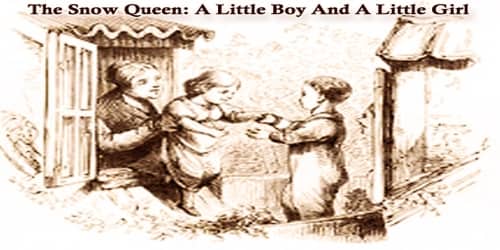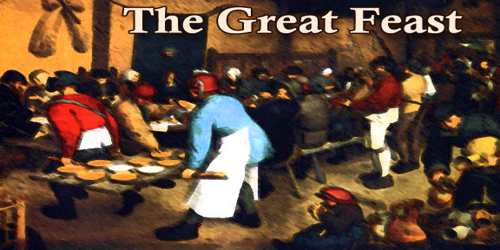In a large town, where there are so many houses, and so many people, that there is no roof left for everybody to have a little garden; and where, on this account, most persons are obliged to content themselves with flowers in pots; there lived two little children, who had a garden somewhat larger than a flower-pot. They were not brother and sister, but they cared for each other as much as if they were. Their parents lived exactly the opposite. They inhabited two garrets; and where the roof of the one house joined that of the other, and the gutter ran along the extreme end of it, there was to each house a small window: one needed only to step over the gutter to get from one window to the other.
The children’s parents had large wooden boxes there, in which vegetables for the kitchen were planted, and little rosetrees besides: there was a rose in each box, and they grew splendidly. They now thought of placing the boxes across the gutter, so that they nearly reached from one window to the other, and looked just like two walls of flowers. The tendrils of the peas hung down over the boxes; and the rose-trees shot up long branches, twined round the windows, and then bent towards each other: it was almost like a triumphant arch of foliage and flowers. The boxes were very high, and the children knew that they must not creep over them; so they often obtained permission to get out of the windows to each other and to sit on their little stools among the roses, where they could play delightfully. In winter there was an end of this pleasure. The windows were often frozen over; but then they heated copper farthings on the stove and laid the hot farthing on the windowpane, and then they had a capital peep-hole, quite nicely rounded; and out of each peeped a gentle friendly eye it was the little boy and the little girl who was looking out. His name was Kay, hers was Gerda.
In summer, with one jump, they could get to each other; but in winter they were obliged first to go down the long stairs, and then up the long stairs again: and out-of-doors there was quite a snow-storm.
“It is the white bees that are swarming,” said Kay’s old grandmother.
“Do the white bees choose a queen?” asked the little boy; for he knew that the honey-bees always have one.
“Yes,” said the grandmother, “she flies where the swarm hangs in the thickest clusters. She is the largest of all, and she can never remain quietly on the earth but goes up again into the black clouds. Many a winter’s nights she flies through the streets of the town and peeps in at the windows, and they then freeze in so wondrous a manner that they look like flowers.”
“Yes, I have seen it,” said both the children; and so they knew that it was true.
“Can the Snow Queen come in?” said the little girl.
“Only let her come in!” said the little boy. “Then I’d put her on the stove, and she’d melt.”
And then his grandmother patted his head and told him other stories.
In the evening, when little Kay was at home, and half undressed, he climbed up on the chair by the window, and peeped out of the little hole. A few snow-flakes were falling, and one, the largest of all, remained lying on the edge of a flower-pot.
The flake of snow grew larger and larger; and at last, it was like a young lady, dressed in the finest white gauze, made of a million little flakes like stars. She was so beautiful and delicate, but she was of ice, of dazzling, sparkling ice; yet she lived; her eyes gazed fixedly, like two stars; but there was neither quiet nor repose in them. She nodded towards the window and beckoned with her hand. The little boy was frightened, and jumped down from the chair; it seemed to him as if, at the same moment, a large bird flew past the window.
The next day it was a sharp frost and then the spring came; the sun shone, the green leaves appeared, the swallows built their nests, the windows were opened, and the little children again sat in their pretty garden, high up on the leads at the top of the house.
That summer the roses flowered in unwonted beauty. The little girl had learned a hymn, in which there was something about roses; and then she thought of her own flowers; and she sang the verse to the little boy, who then sang it with her:
“The rose in the valley is blooming so sweet, And angels descend there the children to greet.”
And the children held each other by the hand, kissed the roses, looked up at the clear sunshine, and spoke as though they really saw angels there. What lovely summer-days those were! How delightful to be out in the air, near the fresh rose-bushes, that seems as if they would never finish blossoming!
Kay and Gerda looked at the picture-book full of beasts and of birds; and it was then the clock in the church-tower was just striking five that Kay said, “Oh! I feel such a sharp pain in my heart, and now something has got into my eye!”
The little girl put her arms around his neck. He winked his eyes; now there was nothing to be seen.
“I think it is out now,” said he; but it was not. It was just one of those pieces of glass from the magic mirror that had got into his eye; and poor Kay had got another piece right in his heart. It will soon become like ice. It did not hurt any longer, but there it was.
“What are you crying for?” asked he. “You look so ugly! There’s nothing the matter with me. Ah,” said he at once, “that rose is cankered! And look, this one is quite crooked! After all, these roses are very ugly! They are just like the box they are planted in!” And then he gave the box a good kick with his foot and pulled both the roses up.
“What are you doing?” cried the little girl; and as he perceived her fright, he pulled up another rose, got in at the window, and hastened off from dear little Gerda.
Afterward, when she brought her picture-book, he asked, “What horrid beasts have you there?” And if his grandmother told those stories, he always interrupted her; besides, if he could manage it, he would get behind her, put on her spectacles, and imitate her way of speaking; he copied all her ways, and then everybody laughed at him. He was soon able to imitate the gait and manner of everyone in the street. Everything that was peculiar and displeasing in them that Kay knew how to imitate: and at such times all the people said, “The boy is certainly very clever!” But it was the glass he had got in his eye; the glass that was sticking in his heart, which made him tease even little Gerda, whose whole soul was devoted to him.
His games now were quite different from what they had formerly been, they were so very knowing. One winter’s day, when the flakes of snow were flying about, he spread the skirts of his blue coat and caught the snow as it fell.
“Look through this glass, Gerda,” said he. And every flake seemed larger, and appeared like a magnificent flower, or beautiful star; it was splendid to look at!
“Look, how clever!” said Kay. “That’s much more interesting than real flowers! They are as exact as possible; there is not a fault in them if they did not melt!”
It was not long after this, that Kay came one day with large gloves on, and his little sled at his back and bawled right into Gerda’s ears, “I have permission to go out into the square where the others are playing;” and off he was in a moment.
There, in the market-place, some of the boldest of the boys used to tie their sleds to the carts as they passed by, and so they have pulled along and got a good ride. It was so capital! Just as they were in the very height of their amusement, a large sled passed by it was painted quite white, and there was someone in it wrapped up in a rough white mantle of fur, with a rough white fur cap on his head. The sled drove round the square twice, and Kay tied on his sled as quickly as he could, and off he drove with it. On they went quicker and quicker into the next street; and the person who drove turned round to Kay, and nodded to him in a friendly manner, just as if they knew each other. Every time he was going to untie his sled, the person nodded to him, and then Kay sat quiet, and so on they went till they came outside the gates of the town. Then the snow began to fall so thickly that the little boy could not see an arm’s length before him, but still on he went: when suddenly he let go the string he held in his hand in order to get loose from the sled, but it was of no use; still the little vehicle rushed on with the quickness of the wind. He then cried as loud as he could, but no one heard him; the snow drifted and the sled flew on, and sometimes it gave a jerk as though they were driving over hedges and ditches. He was quite frightened, and he tried to repeat the Lord’s Prayer; but all he could do, he was only able to remember the multiplication table.
The snow-flakes grew larger and larger, till at last, they looked just like great white fowls. Suddenly they flew on one side; the large sled stopped, and the person who drove rose up. It was a lady; her cloak and cap were of snow. She was tall and of slender figure, and of a dazzling whiteness. It was the Snow Queen.
“We have traveled fast,” said she; “but it is freezingly cold. Come under my bearskin.” And she put him in the sled beside her, wrapped the fur round him, and he felt as though he were sinking in a snow-wreath.
“Are you still cold?” asked her; and then she kissed his forehead. Ah! it was colder than ice; it penetrated to his very heart, which was already almost a frozen lump; it seemed to him as if he were about to die but a moment more and it was quite congenial to him, and he did not remark the cold that was around him.
“My sled! Do not forget my sled!” It was the first thing he thought of. It was there tied to one of the white chickens, who flew along with it on his back behind the large sled. The Snow Queen kissed Kay once more, and then he forgot little Gerda, grandmother, and all whom he had left at his home.
“Now you will have no more kisses,” said she, “or else I should kiss you to death!”
Kay looked at her. She was very beautiful; a more clever, or a more lovely countenance he could not fancy to himself; and she no longer appeared of ice as before, when she sat outside the window, and beckoned to him; in his eyes she was perfect, he did not fear her at all, and told her that he could calculate in his head and with fractions, even; that he knew the number of square miles there were in the different countries, and how many inhabitants they contained; and she smiled while he spoke. It then seemed to him as if what he knew was not enough, and he looked upwards in the large huge empty space above him, and on she flew with him; flew high over the black clouds, while the storm moaned and whistled as though it were singing some old tune. On they flew over woods and lakes, overseas, and many lands; and beneath them the chilling storm rushed fast, the wolves howled, the snow crackled; above them flew large screaming crows, but higher up appeared the moon, quite large and bright; and it was on it that Kay gazed during the long winter’s night; while by day he slept at the feet of the Snow Queen.
















